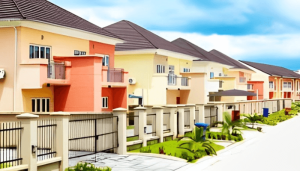Estates excite investors on security concerns

As investors weigh options and search for investment assets with good returns, gated (estates) communities where analysts report 25-30 percent year-on-year demand growth come in handy as a destination.
The demand growth, which in a few instances, is as high as 70-80 percent is driven by concerns around security, future lockdowns as experienced during COVID-19, and protection from vandalism.
However, this growth may worsen the challenges in the high-end market where landlords struggle to fill up spaces, retrofitting assets to better accommodate short-stay occupiers. Managing these assets is, increasingly, challenging, according to market watchers.
A recent report by Northcourt Real Estate affirms that security continues to be a major consideration in the residential real estate market and also demand for gated communities. Abuja has seen demand for residential assets increase because of its position as one of the more secure locations in the country, according to the report.
Ayo Ibaru, Northcourt’s director of research, explains that the increased demand has further driven the rapid redevelopment of retail, hospitality, and residential assets, adding that residents notice a pace of commercial activity similar to Lagos in such areas as Wuse, Gwarimpa, Jabi, Wuye, Garki Area 1, Life Camp, Kubwa, and Katampe nodes.
The report projects that going into the new year, there will be greater emphasis and demand for residences within gated estates that enjoy communal living as this offers security services and leverages the experience, expertise, and network of both the estate management company and the residents’ group.
The expectation is that besides the investment opportunity, which the increased demand offers investors, gated communities also create opportunities for new businesses, especially in the security field.
Read also: Legal and other issues from failed build and sell property deals
“Opportunities exist for security firms offering physical personal security, cyber-security, natural surveillance, security lighting, alarm systems, sensors, video surveillance, electronic access control systems, identification systems, and private military services,” Ibaru points out.
“These new and changing requirements will change what space users demand and how developers build,” he says.
Though there are still pockets of opportunities in commercial real estate, according to Bola Adesola, chairman, Ecobank Nigeria, investment considerations, increasingly, favour residential real estate.
But much of the opportunities in residential real estate are in small-size housing units such as studio, one-bedroom and two-bedroom apartments. Tokunbo Ajayi, CEO, Propertygate Development and Investment Company, explains to BusinessDay that the reason developers and investors opt for these small-size units is because luxury housing units hardly find buyers these days.
Olumide Osundolire, partner at Banwo & Ighodalo, advises that yield-hungry investors looking for where to invest in the New Year could also explore opportunities in the retirement/care homes, which, according to him, is an untapped and un-served market in Nigeria.
The opportunity in this market, he states, arises from the lack of adequate enclosed retirement communities for the elderly, and also from the 2004 reform in the Pension Fund Administration (PFA) scheme that guarantees stable retirement income for the elderly and provides the necessary cash flow to fund this lifestyle.
Osundolire lists three basic types of retirement/care homes, each depending on the range of its services. They include independent living apartments, nursing homes, and home health care. The first type is the current destination for investors with its encouraging return on investment.
“These gated communities are developed with a needs-driven approach to meet the lifestyle needs of the residents from housing design, shopping, exercise and fitness, mobility, health home services, entertainment, community activities, among others,” he states further.
The expectation is that this opportunity is to be nurtured by a significant rise in the population of the aged going forward. Osundolire notes that the aging population is a global trend, quoting a UN report that estimates the world percentage of persons over 60 years old at 13 percent.
Sub-Saharan Africa, which has the smallest proportion of elderly and which is aging slower than the developed regions, he says, is projected to see the absolute size of its older population grow by 2.5 percent between 2000 and 2030.
“Nigeria, the country with the largest population in Africa, estimated at 200 million, has an elderly projected population growth rate of 3.2 percent, a rate that is expected to double by 2050,” Osundolire says.









